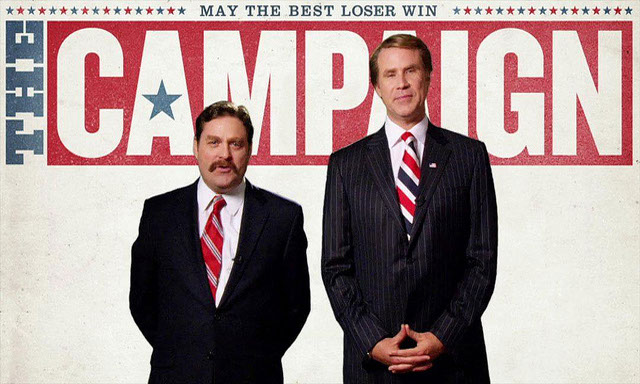
Film: The Campaign
Country: USA
Year of Release: 2012
Starring: Will Ferrel, Zach Galifianakis, Dylan McDermott, John Lithgow, Dan Aykroyd
Director: Jay Roach
Screenwriters: Chris Henchy, Shawn Harwell
♥♥
Given the enormous potential for surrealism and absurdity, it’s an oddly remarkable fact that there are very few American films which take American politics as their subject matter, and odder still that very few of them are comedies. The Campaign, the new Will Ferrel movie, directed by Jay Roach and produced by Zach Galifianakis, who also co-stars, is a middling if vaguely entertaining addition to this tiny genre.
The film tells the story of a local election in which the long-term incumbent congressman Cam Brady (Will Ferrell) accidentally leaves a very explicit erotic voicemail at the home of a conservative Christian family. When two super-rich CEOs (Dan Aykroyd and John Lithgow) – who effectively own the district of North Carolina – decide to sell the region to Chinese interests, they go about putting up their own rival candidate to take over the district.
Considering Brady’s litany of indiscretions, it should be a cinch to win the seat. But there are few politicians in the area who have been untouched by scandal, and the CEOs are forced to choose Marty Huggins (Galifianakis), the naïve and decidedly effeminate (although married) director of a local tourism centre. At first Huggins appears to be an extremely unlikely candidate, but with the help of oodles of money, an extreme makeover and a cutthroat campaign manager (Dylan McDermot), he quickly becomes a political figure capable of giving Brady a run for his money.
Like its premise, much of The Campaign is overstated to the point of being unbelievable – which is not in itself a problem. This is, after all, both a comedy and a mainstream Hollywood product. But by making use of such broad strokes the film lacks comedic finesse as well as the kind of critical insight that might deliver real depth. More centrally, The Campaign lacks bite. As satires goes – and it is undeniably a satire – it’s poor and remarkably blunt. And for once, I think this is a matter of intent rather than default. If Ferrel and co had made a genuinely critical and informed account of American politics, there’s a good chance that they would lose the bulk of their audience. And I don’t this is just about the box office. Ferrel wants to make people laugh. And he wants to make as many people as possible laugh without having to think too much about why they’re laughing. It’s an approach that has made him a global comedy star, and he’s clearly loathe to mess with it.
Sprinkled amid the mediocrity are a few extremely funny lines penned with a venomous intelligence, and its tempting to suggest that Ferrel and Galifianakis could indeed have made a movie that genuinely took on American politics on its own surreal terms. But that would, in truth, not be a Will Ferrel movie, an oeuvre whose aesthetic is expressed most essentially in the extended fart gag. Although I can’t recall any gaseous humour in The Campaign, it’s a metaphor that nonetheless sticks.
That said, I’ve always thought that Ferrel is a more intelligent talent than his output would suggest, even as his arch sense of humour is grounded in a blend of slapstick and the so-flat-they’re-funny non-sequitars that have become the stock-in-trade of 21st century humour. I’m not convinced that the flashes of high intelligence that course through his work are flukes. Instead, I think, they represent a kid of highbrow catnip, a way of appealing to more discerning viewers in the same way that children’s films usually have a parallel script directed at adults which should – ideally – go over the top of younger viewers’ heads.
Of course, there’s a critical arrogance and conceit to this notion – the very idea of a discerning viewer carries its own prejudicial weight. But there’s little doubt that Ferrel’s film are directed at a lower common denominator – the fact that two of the film’s key set-pieces involve the punching of a baby and a dog – both of which are supposedly hilarious (but how?) are proof enough of this.
There’s also a strange flavour of homophobia that runs through the film in its representation of the Huggins character. Although he might not be gay in the film, he’s nonetheless represented as such, or more specifically, as someone – gay, straight or overwise – who acts ‘too gay’, to use the expression of the times. Of course, he’s also the good guy in the film. But there’s a strong suggestion in The Campaign, as well as in so many American films, that the victories of the different must always remain the stuff of sentimental fantasies. Which is ultimately what The Campaign – again, like so many other American and Americanised films – becomes.
© PETER MACHEN 2017